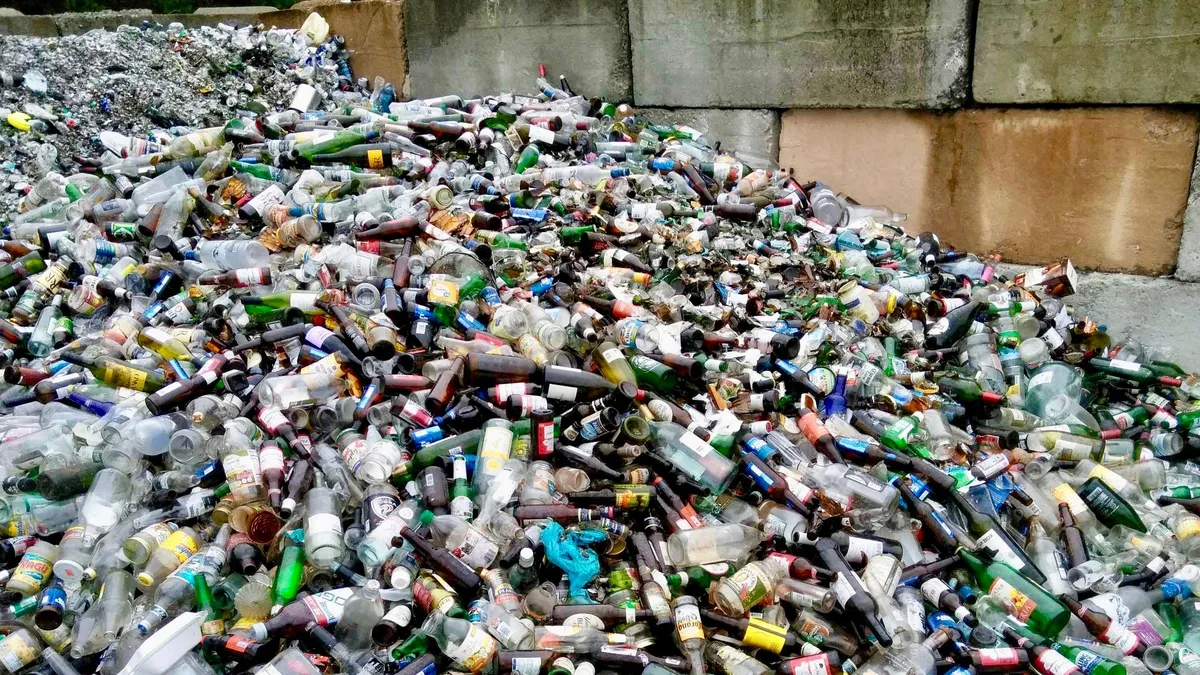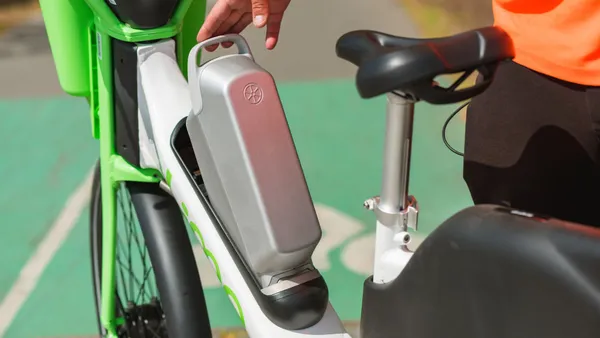Dive Brief:
- California’s new bottle bill provision, which adds wine and distilled spirits to the program, is expected to increase the state glass recycling rate and add funding for recycling programs. The efforts will come with a hefty price tag, the Container Recycling Institute said during a financial summary webinar last week.
- Numerous provisions in SB 1013 will add almost $900 million in recycling program spending over a six-year period, CRI said. Another $379 million in recycling spending, passed in separate state budget bill AB 179, will provide CalRecycle with funding for beverage container recycling and litter reduction efforts.
- The state’s beverage container fund balance was last reported to be $635 million, CRI calculates, and CRI President Susan Collins said the nearly $1.3 billion in new spending over the next six years could significantly drain that fund and prevent the bottle bill program from shoring up effective rainy day savings. “There's not enough money to go around,” she said during the webinar.
Dive Insight:
The bill is one of the more substantial changes to the state’s container deposit systems in recent years, and proponents say the state has long needed to invest more funds in the program.
The bill adds wine and distilled spirits to the state’s container deposit system starting Jan. 1, 2024. It will establish a 10-cent redemption value on most of the bottles, as well as a 25-cent refund on “difficult to recycle” wine packaging including boxes, bladders, pouches and similar plastic containers.
Proponents of SB 1013 also say including wine and liquor bottles will boost the state’s glass beverage recycling rate from about 30% to about 59% while bringing in cleaner glass for recycling. CRI estimates about 500 million more containers will be recycled each year. CRI also estimates that curbside and drop-off programs could receive $46 million in revenue from wine and spirits bottles.
The bill received broad support from large haulers like Recology, Republic Services and WM. Environmental groups, glass bottlers like Anheuser-Busch and recycled glass processor Strategic Materials also supported the bill. Yet groups like Consumer Watchdog said the bill should have directed money toward improving redemption access. CRI, originally a major supporter, changed its stance to neutral, saying the bill includes too many costs.
Other provisions in the bill provide millions of dollars in market development initiatives, grants for the collection, transportation and reuse of recycled glass and funding for local programs aimed at collecting more containers.
Of those provisions, one significant spending item in the bill is a market development payment, which directs CalRecycle to provide a total of $60 million per year through the end of 2027 to manufacturers that purchase recycled glass collected within California to use in new beverage containers.
The law also directs CalRecycle to form three glass processing incentive grants that total $9 million a year. One provides up to $4 million a year to encourage the use of glass cullet in new bottles; the second provides $4 million a year for regional pilot program grants providing glass collection bins at restaurants and other retail locations. The third, a $1 million annual grant, is meant to encourage the use of rail transportation to move empty glass containers to processing facilities. Collins said the three grant programs will go into effect Jan. 1, 2023, which is a year before CRI expects to see higher volumes of glass containers enter the recycling stream.
CalRecycle will also spend $15 million a year for curbside and neighborhood drop-off programs. Other funding would bolster statewide recycling education and other community recycling initiatives and litter reduction programs.
In addition to the container deposit system and related efforts receiving the funding laid out in SB 1013, California’s budget bill calls for more than $233 million in funding for CalRecycle to use in 2023 for beverage container recycling and litter reduction efforts. Over a three-year period, recycling provisions in the budget bill will add up to almost $380 million, CRI estimates.
The 2023 pot of money includes $73.3 million for startup costs for recycling programs, recycling centers, mobile recycling, reverse vending machines and bag drops, dealer cooperatives and equipment. It also calls for $30 million for startup loans for processors and recyclers.
An additional $25 million next year would fund deposit return system plans that incorporate refillable containers, which Collins said is a significant investment in infrastructure for reusable packaging.
“I'm really excited to see what California can do to build out a new infrastructure for renewables. We've never seen [support] like this anywhere in the country,” she said.
The budget bill also calls for funding for workforce development and plastic market development programs —projects CRI is neutral on — but Collins said the organization believes an additional combined $90 million in funding for quality incentive payments “is not an effective use of funds.”














